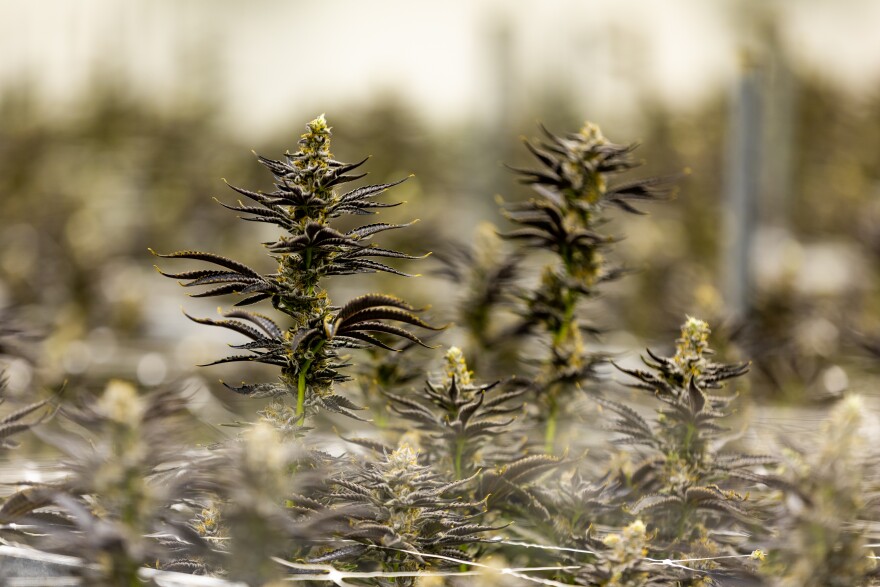Virginia Democrats scrapped a Republican-led effort to set a standard that would identify when workers on manufacturing and utility job sites were impaired by the main psychoactive ingredient in cannabis.
State Sen. Bill Stanley (R–Franklin County) and Del. Kim Taylor (R–Dinwiddie) proposed bills this year, both backed by Republican Gov. Glenn Youngkin, to require the state’s Safety and Health Codes Board to establish a THC impairment standard and testing protocol on manufacturing and utility worksites in Virginia.
The process would have begun by Oct. 1, but both bills failed to advance out of Democratic-controlled committees in the Virginia General Assembly.
Republicans said the proposal would have addressed growing safety concerns among manufacturers and give employers alternatives to zero tolerance policies. Democrats noted that there is no widely-accepted scientific standard for THC impairment and questioned why the Youngkin administration didn’t pursue the effort through the regulatory process.
Stanley told the Senate’s Commerce and Labor committee in January that the legislation’s aim was to eventually “create a base level” of THC that would show if a worker is high on the job — not that they used cannabis days before.
When asked by Democrats on the panel, Stanley acknowledged there is no scientifically-accepted standard for determining whether someone is high or recently used cannabis. But he said multiple factors — including appearance, smell and THC in the blood — could be used to find the standard level.
Stanley called cannabis use “a real problem” in the manufacturing industry, an assertion that Democrats on the Senate committee agreed with. “I don’t think we want our linemen working on high-voltage lines high on marijuana,” he said.

Brett Vassey, president and CEO of the Virginia Manufacturers Association, echoed Stanley’s safety concerns, citing a National Institute on Drug Abuse study that found manufacturing workers who test positive for THC have 55% more industrial accidents and an 85% higher injury rate.
“In our world, in our environment, in manufacturing, if you make a mistake, it’s not just your life you put at risk, it’s everyone around you,” Vassey said.
In Virginia, people 21 and older can possess small amounts of cannabis, grow up to four plants in their homes or buy it with a medical license. Both Stanley and Vassey said the proposal would also allow employers to avoid zero tolerance policies and allow workers legally using cannabis off the job to continue doing so.
Senate Majority Leader Scott Surovell (D–Fairfax) pointed out that the state’s Crime Commission looked at cannabis-impaired driving in 2022 and didn’t move to set up rules because of the difficulty of finding a THC standard.
“We were trying to figure out what we can do about marijuana-impaired driving, and everything we looked at concluded that because [of] the way marijuana metabolizes, it’s basically impossible to set a per se limit for THC like we do on alcohol,” Surovell said. “That’s why we don’t.”
Without a set “per se” limit for cannabis-impaired driving in Virginia — like the .08% limit for blood alcohol concentration — blood tests can’t alone be used to charge a driver with a DUI.
David Johnson, the deputy commissioner of the Virginia Department of Labor and Industry, said the Youngkin administration supported the legislation and that the process of developing the standard would take time.
Surovell asked why the administration needed lawmakers to give it the “green light” to move forward with the regulations, pointing out that state code allows the Safety and Health Codes Board to adopt rules on its own.
Johnson said agencies don’t typically move forward in that way without input from a higher authority and getting some sense of what lawmakers want. Surovell joked that he appreciated Youngkin asking lawmakers to weigh in before taking action, but suggested the bill was introduced because the regulatory process would take longer.
A Youngkin spokesperson did not respond to a request for comment Thursday on why the administration feels it can’t move forward with the regulations without legislation.
Virginia NORML executive director JM Pedini spoke in opposition of the proposal during the Senate panel hearing because there isn’t a scientifically supported THC impairment standard. They said establishing one would directly conflict with state law protecting employees who use medical cannabis.
But Pedini acknowledged software-based applications are used around the U.S. to test THC impairment by measuring an employee’s individual baseline against their test results if an incident occurs. Once that is done, Pedini said employers can move to fluid testing.
The Senate committee ultimately killed Stanley’s bill on a 9–6 party-line vote.
When Taylor’s bill was heard during a much shorter Jan. 30 House subcommittee meeting, Pedini read from a recent blog post by the director of the National Institute on Drug Abuse about the difficulty of detecting cannabis impairment.
“Unlike alcohol, THC remains in the body long after its psychoactive effects have worn off,” Dr. Nora Volkow wrote. “So, unlike commonly used alcohol sobriety tests, blood tests for cannabis that are currently widely used in law enforcement and employment screening cannot distinguish between recent or past use.”
Del. Alfonso Lopez (D–Arlington) said that legislators needed more time to consider the proposal before calling for Taylor’s bill to be laid on the table. On a party-line vote, the subcommittee approved Lopez’s motion to reject the bill, leaving it in committee before the General Assembly’s crossover.



